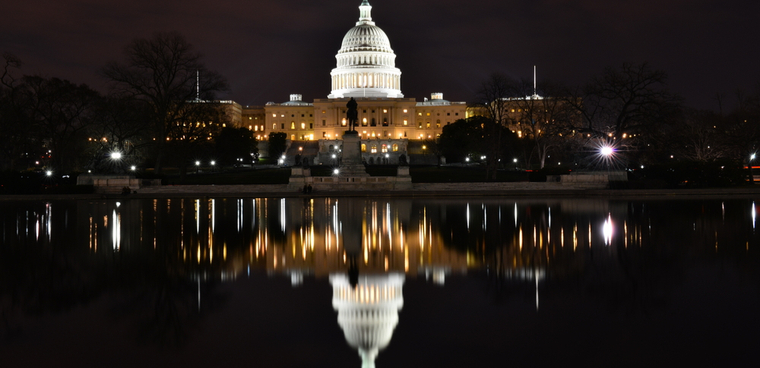Congress votes to end overnight shutdown
The Senate and House voted to pass a two-year topline budget agreement and a six-week continuing resolution. after a brief overnight appropriations lapse after midnight Feb. 8.

In a tense predawn vote on Feb. 9, the House of Representatives passed a combined two-year budget deal and a six-week continuing resolution, bringing a likely end to an overnight government shutdown.
The vote was 240 to 186, with 73 Democrats supporting the bill and 67 Republicans voting no.
The Senate had voted to advance the measure 71-28 in the early morning hours of Feb. 9, just under two hours after the shutdown began. In addition to the two-year funding agreement, the bill keeps the government funded through March 23 and raises the debt ceiling for a year.
Late on Feb. 8, the Office of Management and Budget said it was "currently preparing for a lapse in appropriations." It appears that lapse will be limited to several mostly overnight hours, but at 7 a.m. Eastern Time, the Office of Personnel Management website was still instructing employees to contact their agencies for guidance on how to handle the workday.
In a Feb. 8 memo published as the shutdown neared, OMB Director Mick Mulvaney advised that employees should report to work to "undertake orderly shutdown activities." Mulvaney told feds that a new memo would be released once a funding bill was passed and signed into law. White House spokesman Raj Shah announced President Donald Trump's support for the bill at a Feb. 8 press briefing.
Once signed by the president, the new budget agreement will raise spending limits allowable under the Budget Control Act to cap discretionary military spending at $700 billion for fiscal year 2018 and $716 billion in fiscal 2019. Civilian spending is bumped to $591 billion for 2018 and $605 billion for 2019. Those figures include additional dollars from the Overseas Contingency Operations and emergency funds.
"Once the president signs this bill into law, we will have a clear path to pursue our ambitious agenda for 2018," House Speaker Paul Ryan (R-Wis.) said in a statement.
The shutdown had not been expected after Senate leaders announced a budget agreement on Feb. 7. As that chamber tried to vote on Feb. 8, however, Sen. Rand Paul (R-Ky.) opposed to a move for quick action, and a subsequent floor speech from the Kentucky Republican delayed consideration of the bill until after the previous continuing resolution expired at midnight.
"People understand that this is the act of a single senator who just is trying to make a point but doesn’t really care about who he inconveniences and the outcome is not going to be any different," Senate Majority Whip John Cornyn (R-Texas) told reporters as the clock edged closer to a shutdown on Thursday night.
House Minority Leader Nancy Pelosi (D-Calif.) did not support the bill, and reportedly urged her colleagues to "use our leverage," but the Democratic leadership did not actively whip votes against the measure. In a "dear colleague" letter, Pelosi praised the new domestic spending in the budget bill, but added, "we cannot allow our success in one part of the discussion to diminish our leverage in another."
Democratic leaders including Pelosi sent a late-night letter to Ryan on Feb. 8 urging him to pledge to bring up multiple immigration bills, including a bipartisan measure sponsored by Rep. Will Hurd (R-Texas), a leader on IT issues. Pelosi seeks a "Queen of the Hill" rule that allows for consideration of multiple related immigration proposals, with the measure receiving the most votes passing. The lack of such a pledge -- Ryan has said he will bring an immigration bill to the floor only if it has Trump's support -- suggests immigration will continue to loom over efforts to fund the government beyond the new shutdown deadline of March 23.






